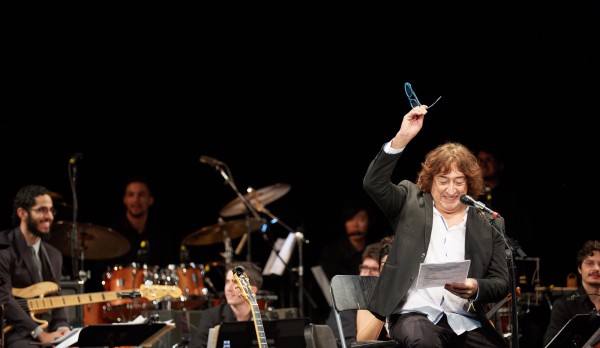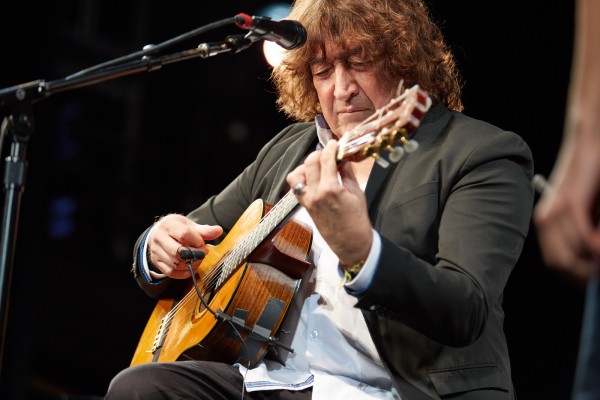Music Feature: Guitarist and Composer Toninho Horta Meets Berklee
Toninho Horta’s musical signature is one of the most distinctive, with complex harmonies, subtle but masterful guitar work, and gentle, plaintive vocals outlining indelible melodies.
By Evelyn Rosenthal
For fans of jazz and world music, one of the perks of living in the Boston area is the bounty of performances by a diverse range of top-quality musicians that the many colleges and universities bring to town and share with the public. One of the most satisfying events of the fall is always Berklee College of Music’s Signature/Visiting Artist Series, when internationally recognized composers and musicians spend the better part of a week working with students, sharing their stories and techniques, and participating in master classes and rehearsals, all culminating in a concert of the guest artist’s music.
Though the series has featured music of various countries, in recent years Brazil has made a strong showing, with renowned samba, bossa nova, and MPB (Música popular brasileira) artists such as Rosa Passos, Ivan Lins, Guinga, and Joyce Moreno. This year Berklee invited the celebrated guitarist and composer Toninho Horta, whose own musical signature is one of the most distinctive, with complex harmonies, subtle but masterful guitar work on both nylon-string and electric, and gentle, plaintive vocals outlining indelible melodies.
On Tuesday, November 1, Horta gave a master class at Berklee’s David Friend Recital Hall. Backed by an all-star faculty band—pianist Gilson Schachnik, flutist Fernando Brandão, bassist Oscar Stagnaro, and drummer Mark Walker—he treated students, faculty, and Boston-area Brazilian music fans to a few of his compositions and talked about his musical influences and path.
Horta grew up in Belo Horizonte, capital of the state of Minas Gerais, in a musical family. Encouraged by his older brother Paulo, a bassist, he began to play the guitar at the age of nine, “with only two fingers,” he said. Horta’s given name is “Antônio,” and like most Brazilian musicians of his generation, he came under the spell of another Antônio, the great Jobim. In fact, the first song he wrote, he said, was inspired by Jobim’s classic bossa nova “Corcovado.” Much later, soon after Jobim’s death in 1994, he began writing a song in his honor, “From Ton to Tom”—a play on “ton,” the Brazilian word for “musical key,” and Jobim’s nickname, “Tom,” which share the same pronunciation in Brazilian Portuguese. In keeping with his approach to composition—“I don’t think about tempo, scales; I just start playing”—the writing of that song started with a chord. The self-taught Horta seems to have intuited a deep understanding of harmony, and he noted that early on he fell in love with a particular chord, A-minor 7 flat 5—not one of your standard-issue first guitar chords.
Horta touched on aspects of his sound, saying he often tries to “emulate the sound of the piano on the guitar,” and looks for “the beautiful note,” playing the minimal amount of notes to shape his solos. In describing his music, he mentioned Pat Metheny’s comment in a liner note to Horta’s album Diamond Land: “Somehow, he writes chord progressions that defy gravity—sometimes his chords ascend just when you think they’re going to descend.” Though many of his songs have lyrics, he’s also well known for using his voice as an instrument, wordlessly vocalizing the melody over his guitar work.
The genial, warmhearted Horta delighted in sharing his stories and music with the Berklee audience. He recounted, almost wistfully, that when he first met and played with Metheny in the early 1980s, he thought of coming to the renowned jazz school to study the scales and theory that Metheny (who had taught there briefly in the 1970s) had mastered, but was dissuaded. “Just keep doing what you’re doing,” Metheny told him—obviously a tribute to his innate musicality and his already outstanding writing and playing.
Horta first came to prominence in the early 1970s as a member of the “Clube da Esquina” (Corner Club), a group of young musicians and friends from Minas Gerais that included Wagner Tiso, Lô and Márcio Borges, Beto Guedes, and the Brazilian musical giant Milton Nascimento. He continued to work with Milton, and both were “discovered” by American jazz musicians like Wayne Shorter and Metheny, who picked up the jazz/Brazilian music connection in the ’70s that Stan Getz and others had initiated with the bossa nova generation in the ’60s. His career has also included turns as a sideman, arranger, producer, and duo partner with such Brazilian greats as Elis Regina, Joyce, Flora Purim and Airto Moreira, Edu Lobo, Luciana Souza, and Sergio Mendes (see my review of Mendes’s 2014 album Magic).
Beginning in 1979 with Terra dos Pássaros (Land of the Birds—a nod to Birdland?), Horta has continued to release albums under his own name, and to write, arrange, and perform some of the most memorable compositions in Brazilian music.
Eleven of those works were highlighted in the November 2 concert at Berklee Performance Center. Around thirty students had worked for months on the material, creating new arrangements and rehearsing for the concert, which was produced and directed by faculty members Oscar Stagnaro, Matthew Nicholl, and Lee Abe. The first half of the program featured the student ensemble of rhythm section, piano, guitar, horns, strings, and four vocalists opening with one of Horta’s best-known tunes, “Aquelas Coisas Todas” (All Those Things), followed by the gorgeous “Beijo Partido” (Broken Kiss).
Horta joined the group for the second half, beginning with the lilting “Mountain Flight.” On his own arrangement of Jobim’s “Amor em Paz” (known in English as “Once I Loved”), he sang and played nylon-string guitar, with Gerson Lazo Quiroga on upright bass and Danilo Amuedo de Souza on drums. The intimate bossa nova was followed by a full-throttle, rocking version of “Viver de Amor,” arranged by Lazo Quiroga and featuring solo turns by saxophonist Nadav Ben-Ozer, guitarist François Chanvallon, and trombonist Suzuko Hori. The beautiful ballad “Waiting for Angela” began with a lovely piano intro by Jiwon Kwon, and featured solos by her and by Horta.
The concert ended on a personal note with “Aqui, Oh!,” one of Horta’s earliest songs and a rousing samba celebrating his beginnings in Minas Gerais. The students, hailing from five continents, seemed thrilled to have taken part in this journey through the Brazilian composer’s career. And Horta seemed equally thrilled to have shared with them, and with the audience, selections from his impressive body of work.
The Berklee residency came at a perfect time in Horta’s career, as he has recently been looking back and taking stock of his fifty or so years in music. His fans—especially the many musicians among them—will be happy to hear that he has just published a songbook, 108 Partituras (108 Scores), featuring the major compositions, with biographical notes by fellow mineiro guitarist and composer Juarez Moreira, and his own decade-by-decade account of his musical development.
Evelyn Rosenthal is a professional singer specializing in jazz and Brazilian music, a freelance editor, and the former editor in chief and head of publications at the Harvard Art Museums. She writes about musical theater, music, and books for the Arts Fuse.
Tagged: Berklee College of Music, Berklee student ensemble



such an amazing concert described by you, Evelyn!!! I’m glad to read that! Congratulations!